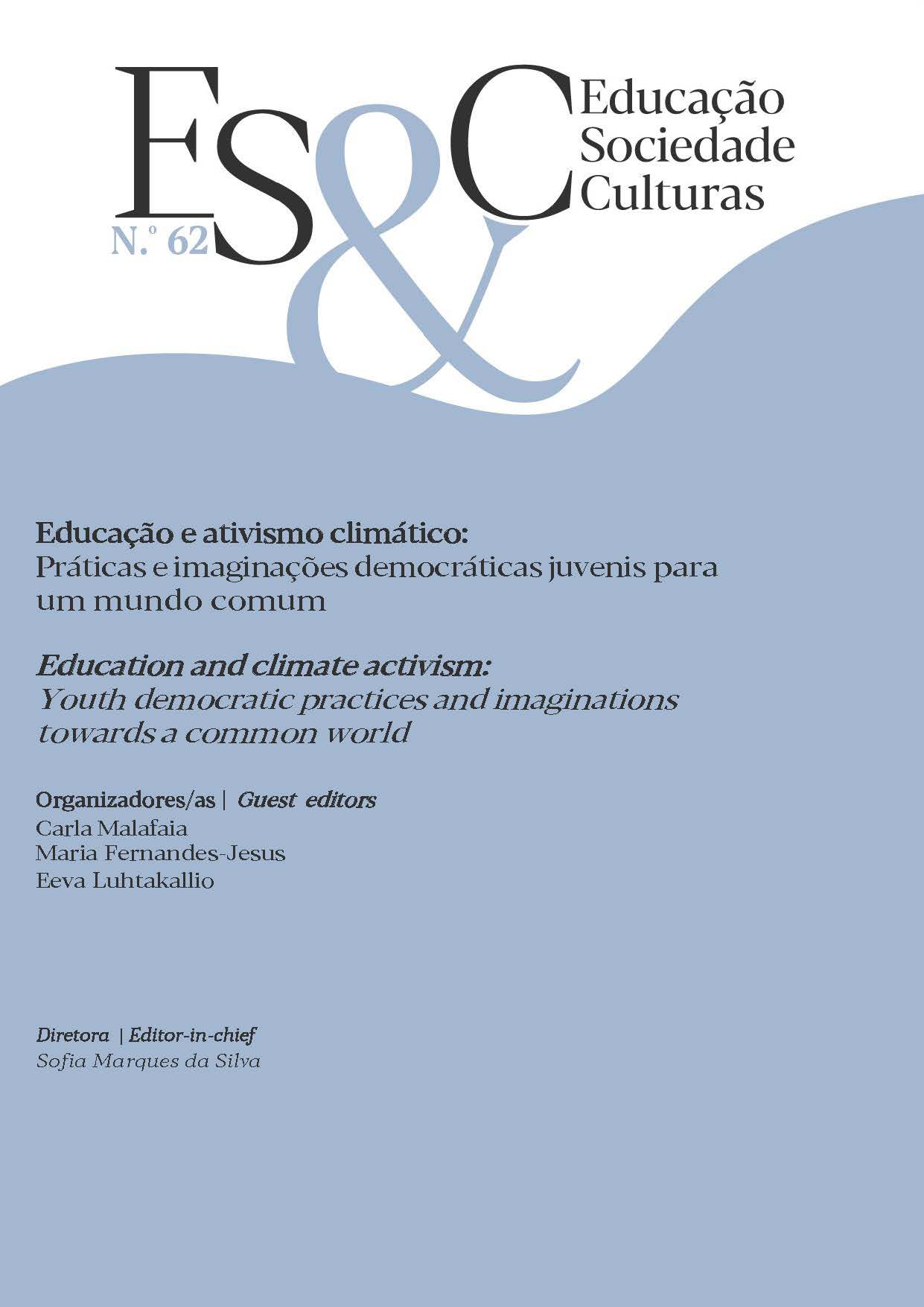Educação e ativismo climático
Práticas e imaginações democráticas juvenis para um mundo comum
DOI:
https://doi.org/10.24840/esc.vi62.358Palavras-chave:
ativismo climáticoResumo
Young people around the world have become mobilized by the urgency to tackle the climate crisis. Increasingly gaining momentum, youth activist movements have been calling everyone’s attention to governmental inaction regarding the climate crisis and to the shortcomings of institutional political agreements (European Youth Forum, 2019). While for some parts of the general public (mostly in the Global-North, which has been less affected by) the consequences of climate change may still seem a somewhat distant, abstract and dystopian phenomenon, as they become more widely felt, the harder it will be to reverse the problem (Giddens, 2009). Faced with the paradox of having a problem that may seem ‘not quite severe enough’ while aiming at triggering generalized motivation for individual and collective change, young generations have been defying ‘adultist biases’ and mobilizing among themselves in new ways and dimensions.
Downloads
Referências
Arendt, Hannah (1958). The human condition. The University of Chicago Press.
Barnwell, Garret, Stroud, Louise, & Watson, Mark (2020). “Nothing green can grow without being on the land”: Mine-affected communities’ psychological experiences of ecological degradation and resistance in Rustenburg, South Africa. Community Psychology in Global Perspective, 6(2/2), 87- 109. doi:10.1285/i24212113v6i2-2p87
Barth, Markus, Masson, Torsten, Fritsche, Immo, Fielding, Kelly, & Smith, Joanne (2021). Collective responses to global challenges: The social psychology of pro-environmental action. Journal of Environmental Psychology, 74, 101562. https://doi.org/10.1016/j.jenvp.2021.101562
Bergmann, Zoe, & Ossewaarde, Ringo (2020). Youth climate activists meet environmental governance: Ageist depictions of the FFF movement and Greta Thunberg in German newspaper coverage. Journal of Multicultural Discourses, 15(3), 267-290. https://doi.org/10.1080/17447143.2020.1745211
Biswas, Tanu, & Mattheis, Nikolas (2022). Strikingly educational: A childist perspective on children’s civil disobedience for climate justice. Educational Philosophy and Theory, 54(2), 145-157. https://doi.org/10.1080/00131857.2021.1880390
Castoriadis, Cornelis (1994). Radical imagination and the social instituting imaginary. In G. Robinson & J. Rundell (Eds.), Rethinking imagination: Culture and creativity (pp. 136-154). Routledge.
Dewey, John (1916). Democracy and education. The Macmillan Company.
Elliott, Rebecca (2018). The sociology of climate change as a sociology of loss. European Journal of Sociology / Archives Européennes de Sociologie, 59(3), 301-337. https://doi.org/10.1017/S0003975618000152
Downloads
Publicado
Como Citar
Edição
Secção
Licença
Direitos de Autor (c) 2022 Carla Malafaia

Este trabalho encontra-se publicado com a Licença Internacional Creative Commons Atribuição-NãoComercial-CompartilhaIgual 4.0.
Os/as autores/as mantêm os direitos autorais, sem restrições, e concedem à revista ESC o direito de primeira publicação, com o trabalho simultaneamente licenciado sob a Creative Commons Atribuição-NãoComercial-CompartilhaIgual 4.0 Internacional (CC BY-NC-SA). É permitido copiar, transformar e distribuir e adaptar o material em qualquer suporte ou formato, desde que com o devido reconhecimento da autoria e publicação inicial nesta revista, as alterações sejam identificadas e seja aplicada a mesma licença ao material derivado, não podendo ser usado para fins comerciais.









